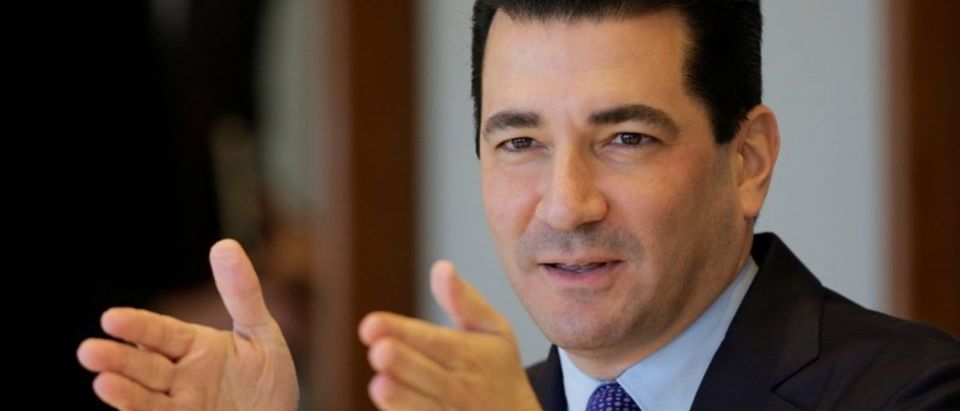The leader of the Food and Drug Administration is warning electronic cigarette companies to “step up soon” on restricting teen access or face a regulatory crackdown.
FDA Commissioner Scott Gottlieb, speaking at the American Society of Clinical Oncology (ASCO) Annual Meeting in Chicago Saturday, said he has been “disappointed” with the response from the vaping industry since the agency began seeking public input on nicotine flavors in March. Gottlieb fears flavored products may be hooking teens on nicotine and wants e-cigarette manufacturers to ensure their products never make it into the hands of adolescents, reported The Spokesman-Review.
An endless slew of media coverage calling vaping an “epidemic” among teens adds to the general hysteria around vaping and nicotine flavors, with critics claiming options like mango and cherry will lead a new generation to traditional tobacco products like cigarettes. (RELATED: San Francisco’s Flavor Ban Threatens Livelihood Of Vape Shop Owners And Local Retailers)
“These e-cig companies have a chance to do something about it,” Gottlieb said Saturday. “The window is open. But it won’t be open for very long. They better step up and step up soon — to address these trends along with us. So far, I must say, I’ve mostly been disappointed by the tepid response from companies that know that a meaningful portion of their sales are being derived from kids. They need to look at this as a matter of urgent public health and not a PR challenge.”
Vaping advocates agree the products should be kept out of the hands of underage users, however, data on teen use simply does not justify the hysteria. A large amount of teens are experimenting with e-cigarettes, but teen smoking is declining to historic lows. A small minority of manufacturers engage in what the FDA considers inappropriate marketing, yet the broader industry appears committed to doing what they can to keep their products out of the hands of teens.
JUUL Labs for example, the company currently dominating the vapor market, announced in April an investment of $30 million over the next three years that will go toward funding independent research into the “scientific and societal implications of vapor products.” They are currently working with Democratic Attorney General Tom Miller of Iowa and a group of public health officials to develop a “transparent” framework for conducting independent research.
JUUL will also back legislation raising the minimum purchasing age on tobacco and nicotine products to 21, although industry experts note this will do little to address access for youths, who typically get the products through a third party like a parent or sibling.
Public health experts are cautioning the FDA to avoid a blanket crackdown on the vaping industry that risks undoing the gains made in reducing the U.S. smoking rate.
“The FDA is … asking for a level of proof about its public health effects that’s probably unattainable,” Kenneth Warner, a public health professor at the University of Michigan, told The Washington Post. “I’m sympathetic about worrying about the impact on kids. I just don’t want to throw out the baby with the bathwater.”
Detractors of vaping and flavor options often conflate teen experimentation with regular use, something many studies do not clearly differentiate. The University of Michigan’s annual Monitoring the Future Survey for example, released Dec. 14, showed nearly 28 percent of teens admitted to trying a vape device within the previous year of the survey.
The results are more complex, however, with many students using vapes for marijuana, which function differently than a device delivering nicotine. More than 50 percent of students who admitted vaping in the previous year said they only used flavors that do not contain nicotine. Only 11 percent of 12th graders reported vaping nicotine in the survey.
Meanwhile, the study revealed reported cigarette use among 12th graders fell to 4.2 percent in 2017, down from 24.6 percent in 1997, even as the number of youth trying a vaping device spiked.
Public health experts focused on harm reduction note flavor restrictions will likely serve to marginalize former smokers relying on a vape to satiate their nicotine cravings, potentially pushing them back to deadly combustible cigarettes.
Researchers from the Yale School of Public Health and the Centre for Health Policy at the Imperial College in London published a study in September 2017 investigating the impact flavor restrictions may have on e-cigarette use. The scientists found that a ban on e-cigarette flavors in the U.S. would reduce the use of vaping devices by more than 10 percent, suggesting users would default back to more harmful cigarettes.
Harm-reduction experts say an FDA intervention into flavored products risks upending the vapor industry and hurting smokers who have successfully quit with e-cigarettes, while simultaneously protecting Big Tobacco’s cigarette trade.
All content created by the Daily Caller News Foundation, an independent and nonpartisan newswire service, is available without charge to any legitimate news publisher that can provide a large audience. All republished articles must include our logo, our reporter’s byline and their DCNF affiliation. For any questions about our guidelines or partnering with us, please contact licensing@dailycallernewsfoundation.org.


